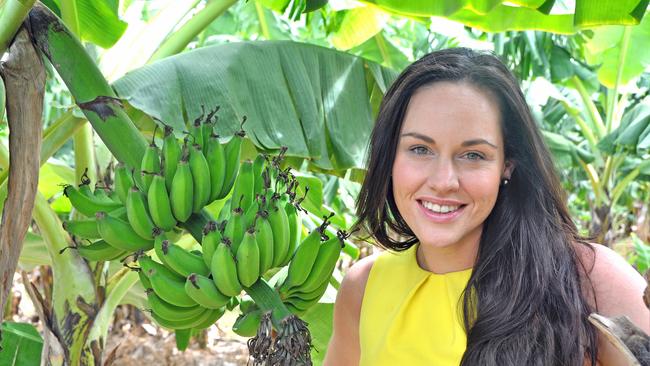Bending the banana business
Too big, too small, too straight, too bent — but Krista Watkins’ Lady Fingers don’t go to waste.

It’s one of the more jolly recorded messages you’ll hear, saying the people at the business you seek are “out in the paddock growing the world’s happiest bananas”.
It’s the office voicemail of Krista Watkins, who is managing director of Natural Evolution Foods, which from a start hand-peeling a few kilos of green bananas in a north Queensland garage has taken the world by storm.
Insofar as bananas have souls, those processed by Watkins’ company do have one possible reason to be happier than others. They know that, rather than go to waste, they’ll be ground up into banana flour and sold widely as a superfood by a cleverly marketed, highly successful and rapidly expanding business.
Watkins, whose parents ran a north Queensland cattle property, went to school in Cairns then graduated from James Cook University with a degree in education, science and politics. For 12 years she worked as a teacher and in management support for the state education system.
Watkins tells The Deal that at that stage she “did definitely plan on not having a career in agriculture”.
But she fell for second-generation banana grower Rob Watkins, married him and moved to a 325ha banana plantation at Walkaminon the Atherton Tableland.
The farm specialised in the small, delicate and more labour-intensive Lady Finger variety of bananas. To get into supermarkets they have to be just right. The wastage was huge — any Lady Fingers not big enough, too big, too straight or too curved were rejected, and that constituted a substantial proportion of the Watkins’ production. Each Friday they would dump tonnes of rejects at a tip.
What they noticed was that the local wallabies, pigs and livestock loved eating the reject bananas, particularly the unripe green ones.
‘We have created a market that didn’t exist’
The second eureka moment came when Rob by accident drove over a hand of green bananas which had dried out on the road — they exploded into a cloud of dust and, when he tasted the powder, it was like flour and did not taste particularly like bananas.
Bananas are one of the biggest crops around the world but no-one appeared to have tried to turn the green ones into flour form and sell it. “We have created a market that didn’t exist,” Watkins says.
Her husband was good at developing the machinery to promote banana flour production while Watkins had marketing skills developed from “my education perspective in telling people what that product was”.
It’s been a classic case of starting small, testing the market and product, and expanding in stages.
The start was hand-numbingly difficult work peeling green bananas — they’re hard and difficult to skin — in the garage to produce a small batch of 6kg per week sold through the Watkins family’s cafe.
The gluten-free banana flour started selling out very quickly and Watkins planned the next stage, a small on-site production operation using a peeling machine designed by Rob. “We did a proof-of-concept plant in an old cold room, and made 350kg a week,” Watkins says.
Demand kept expanding at least as fast as supply.
“We went talking to ingredient manufacturers who said they needed a tonne of powder, so we said let’s scale this, and we built our commercial facility,” Watkins says.
That facility produces a tonne of banana flour a day.
By this time, Watkins had obtained a lot of research on banana flour and found it high in what’s known as resistant starch, which supports good gut bacteria.
Today the range of products marketed under the Natural Evolution brand, or by manufacturers who take the raw material to make downstream products, is huge. Woolworths sells the banana flour under its Macro brand.
Natural Evolution also offers pre-mixes for chocolate cake and banana bread, banana ointment, health supplements and skincare products. The plan is to expand production up to 10-fold a year from now, with a new plant able to produce eight to 10 tonnes of banana flour a day.
“It’s been a really crazy journey,” says Watkins, who has nine staff at the existing plant. “From a product new to market, we have ended up creating such a demand for that product we are struggling to catch up.”
When a fire tore through their plantation a year ago the couple gave up growing bananas altogether, instead leasing their land out and taking waste bananas from other growers in huge quantities. Watkins branched out — she tried making waste sweet potatoes, rich in vitamin A, into powder.
“Now people are buying it and throwing it in their smoothies,” she says. Then, rather than putting the by-product juice from the sweet potatoes on to banana trees for fertiliser, the couple asked Rob’s brother, distiller Mark Watkins, to try to make vodka out of it.
That worked a treat, and Watkins has set up a new company, Plantation Brew Co, to market it. Would she ever take Natural Evolution, now a private company, to a public listing?
“When the time’s right, yes,” she says.




To join the conversation, please log in. Don't have an account? Register
Join the conversation, you are commenting as Logout